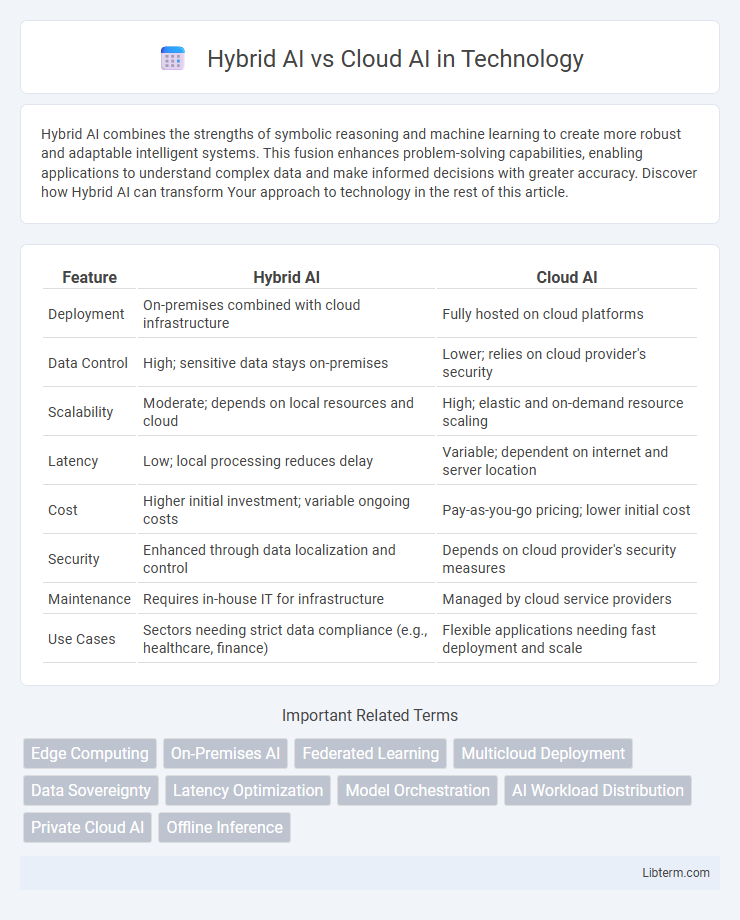Hybrid AI combines the strengths of symbolic reasoning and machine learning to create more robust and adaptable intelligent systems. This fusion enhances problem-solving capabilities, enabling applications to understand complex data and make informed decisions with greater accuracy. Discover how Hybrid AI can transform Your approach to technology in the rest of this article.
Table of Comparison
| Feature | Hybrid AI | Cloud AI |
|---|---|---|
| Deployment | On-premises combined with cloud infrastructure | Fully hosted on cloud platforms |
| Data Control | High; sensitive data stays on-premises | Lower; relies on cloud provider's security |
| Scalability | Moderate; depends on local resources and cloud | High; elastic and on-demand resource scaling |
| Latency | Low; local processing reduces delay | Variable; dependent on internet and server location |
| Cost | Higher initial investment; variable ongoing costs | Pay-as-you-go pricing; lower initial cost |
| Security | Enhanced through data localization and control | Depends on cloud provider's security measures |
| Maintenance | Requires in-house IT for infrastructure | Managed by cloud service providers |
| Use Cases | Sectors needing strict data compliance (e.g., healthcare, finance) | Flexible applications needing fast deployment and scale |
Introduction to Hybrid AI and Cloud AI
Hybrid AI integrates on-premises artificial intelligence systems with cloud-based AI services to optimize performance, scalability, and data privacy. Cloud AI leverages remote servers and massive data centers to provide scalable machine learning models and real-time analytics via internet access. Both architectures aim to enhance AI capabilities by balancing computational resources, data security, and operational efficiency.
Defining Hybrid AI: Key Features
Hybrid AI integrates both on-premises artificial intelligence systems and cloud-based AI services, combining the strengths of local processing power and scalable cloud resources. Key features include enhanced data privacy, faster processing speeds due to local computing, and flexibility in managing workloads across environments. This approach enables seamless interoperability, cost efficiency, and improved compliance with data regulations compared to exclusively cloud-based AI solutions.
Overview of Cloud AI: Core Concepts
Cloud AI leverages scalable, on-demand computing resources hosted on remote servers to deliver advanced artificial intelligence services, including machine learning, natural language processing, and computer vision. It enables rapid deployment and integration of AI models without the need for extensive local infrastructure, supporting diverse applications from data analytics to real-time decision making. Key components include cloud storage, distributed computing, AI frameworks, and APIs that facilitate seamless access and collaboration across global networks.
Architecture Differences: Hybrid AI vs Cloud AI
Hybrid AI architecture combines on-premises infrastructure with cloud resources, enabling data processing both locally and remotely to optimize latency and control. Cloud AI relies entirely on scalable cloud platforms, offering vast computational power and seamless integration with cloud-native services but depending heavily on internet connectivity. The core architectural difference lies in Hybrid AI's ability to balance data privacy and real-time performance through edge computing, while Cloud AI emphasizes elasticity and centralized management within cloud environments.
Performance and Scalability Comparison
Hybrid AI combines on-premises infrastructure with cloud resources, enabling low-latency processing and data security while leveraging scalable cloud compute power for complex AI workloads. Cloud AI offers virtually unlimited scalability through elastic resource allocation and access to large datasets but may experience latency issues and data transfer bottlenecks. Performance in Hybrid AI excels in real-time applications due to localized processing, whereas Cloud AI shines in handling massive, distributed tasks with scalable, high-throughput environments.
Data Security and Privacy Considerations
Hybrid AI combines on-premises infrastructure with cloud services, enabling organizations to process sensitive data locally while leveraging cloud scalability, thus enhancing data security and privacy control. Cloud AI relies on remote servers for data storage and processing, which may expose sensitive information to increased risks without robust encryption and access management. Enterprises prioritize hybrid AI solutions to maintain compliance with data protection regulations like GDPR and HIPAA, ensuring critical data remains within secure, controlled environments.
Use Cases: When to Choose Hybrid AI
Hybrid AI excels in use cases requiring data privacy, low latency, and local processing, such as healthcare diagnostics, manufacturing automation, and financial services compliance. Organizations handling sensitive data or operating in regulated industries prefer Hybrid AI to maintain control over on-premises datasets while leveraging cloud capabilities for scalability. This approach balances edge computing performance with cloud AI's resource power, optimizing operational efficiency and security.
Use Cases: When to Prefer Cloud AI
Cloud AI excels in use cases demanding scalable processing power and real-time data analytics, such as large-scale customer behavior analysis, fraud detection, and natural language processing for chatbots. It is preferable when organizations require rapid deployment, seamless integration with cloud-based services, and continuous updates without infrastructure management overhead. Enterprises dealing with dynamic workloads or needing AI-driven insights across distributed teams optimize performance and cost efficiency by leveraging Cloud AI solutions.
Cost Implications and Resource Management
Hybrid AI integrates on-premises infrastructure with cloud resources, allowing organizations to optimize costs by leveraging existing hardware while scaling with cloud services during peak demands. Cloud AI offers flexible pay-as-you-go pricing models, reducing upfront capital expenditures but potentially leading to unpredictable costs with extensive usage. Resource management in Hybrid AI involves balancing internal IT maintenance with cloud resource allocation, whereas Cloud AI centralizes resource management with provider-driven scalability and automated infrastructure maintenance.
Future Trends in AI Deployment Models
Hybrid AI combines on-premises infrastructure with cloud-based AI services, enabling flexible data processing and enhanced security for sensitive information. Cloud AI offers scalable, cost-effective access to advanced machine learning models and computing power, driving rapid innovation across industries. Future trends emphasize hybrid AI's role in bridging data privacy concerns while leveraging cloud AI's scalability to optimize AI deployment in enterprise environments.
Hybrid AI Infographic

 libterm.com
libterm.com